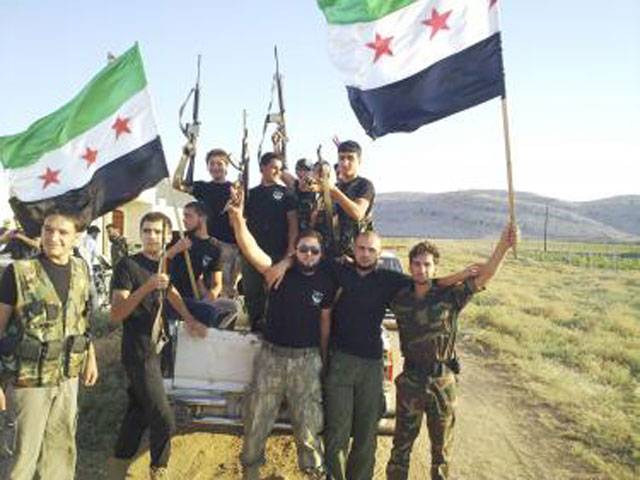BEIRUT (Reuters/AFP) - Veteran fighters of last year's civil war in Libya have come to the front-line in Syria, helping to train and organise rebels under conditions far more dire than those in the battle against Muammar Gaddafi, a Libyan-Irish fighter has told Reuters.
Hussam Najjar hails from Dublin, has a Libyan father and Irish mother and goes by the name of Sam. A trained sniper, he was part of the rebel unit that stormed Gaddafi's compound in Tripoli a year ago, led by Mahdi al-Harati, a powerful militia chief from Libya's western mountains.
Harati now leads a unit in Syria, made up mainly of Syrians but also including some foreign fighters, including 20 senior members of his own Libyan rebel unit. He asked Najjar to join him from Dublin a few months ago, Najjar said.
The Libyans aiding the Syrian rebels include specialists in communications, logistics, humanitarian issues and heavy weapons, he said. They operate training bases, teaching fitness and battlefield tactics.
Najjar said he was surprised to find how poorly armed and disorganized the Syrian rebels were, describing Syria's Sunni Muslim majority as far more repressed and downtrodden under Assad than Libyans were under Gaddafi.
"I was shocked. There is nothing you are told that can prepare you for what you see. The state of the Sunni Muslims there - their state of mind, their fate - all of those things have been slowly corroded over time by the regime."
Meanwhile, Syria's former prime minister, the highest profile government figure to defect, said Tuesday the regime was collapsing and controlled barely a third of the conflict-wracked country.
"The Syrian regime only controls 30 percent of Syria's territory. It has collapsed militarily, economically and morally," Riad Hijab told a news conference in the Jordanian capital Amman.
Hijab fled to Jordan last week, the latest in a string of defections from President Bashar al-Assad's regime, which is becoming increasingly embattled as the 17-month conflict shows no signs of abating.
The United States, which has imposed a raft of tough sanctions to try to force Assad's departure, reacted by lifting an asset freeze imposed on Hijab.
"The United States encourages other officials within the Syrian government, in both the political and military ranks, to take similarly courageous steps to reject the Assad regime and stand with the Syrian people," Treasury official David Cohen said.
Western policymakers hope that a wave of defections will force the collapse of the autocratic government, ending a conflict that seems to be in stalemate with the international community deeply divided over what action to take.
In another blow, rebels claimed Monday they had shot down a Syrian fighter jet and captured its pilot as it battles escalating air attacks by government forces, particularly in the key northern city of Aleppo.
Meanwhile, UN humanitarian chief Valerie Amos held talks in Syria on Tuesday on ways to step up relief efforts as the country faces an increasingly precarious humanitarian situation.
She met government officials in Damascus and is due to meet aid groups including the local Red Crescent as well as families affected by the conflict on a trip that will also take her to neighbouring Lebanon, a UN spokesman said.
Among those she met were Syria's new Prime Minister Wael al-Halqi, who replaced Riad Hijab following his defection last week.
The visit "aims to draw attention to the deteriorating humanitarian situation in Syria and the impact of the conflict on people either remaining in Syria and who have fled to other countries, including Lebanon," the UN office for the coordination of humanitarian affairs (OCHA) said ahead of her arrival.
While in Syria, Amos was expected to discuss ways of urgently scaling-up relief efforts and reducing the suffering of civilians caught up in the fighting.
Two million people are now estimated to have been affected by the Syria conflict and more than one million are internally displaced as fighting continues in Damascus, Aleppo and other cities, OCHA said.
Saturday, April 20, 2024
Libyan fighters join Syrian revolt

22 suspects arrested
April 20, 2024
RCCI chief for promoting law-abiding culture
April 20, 2024
Provision of quality education govt’s priority: KP minister
April 20, 2024
A Tense Neighbourhood
April 19, 2024
Dubai Underwater
April 19, 2024
X Debate Continues
April 19, 2024
Hepatitis Challenge
April 18, 2024
IMF Predictions
April 18, 2024
Kite tragedy
April 19, 2024
Discipline dilemma
April 19, 2024
Urgent plea
April 19, 2024
Justice denied
April 18, 2024
AI dilemmas unveiled
April 18, 2024
ePaper - Nawaiwaqt
Advertisement
Nawaiwaqt Group | Copyright © 2024





